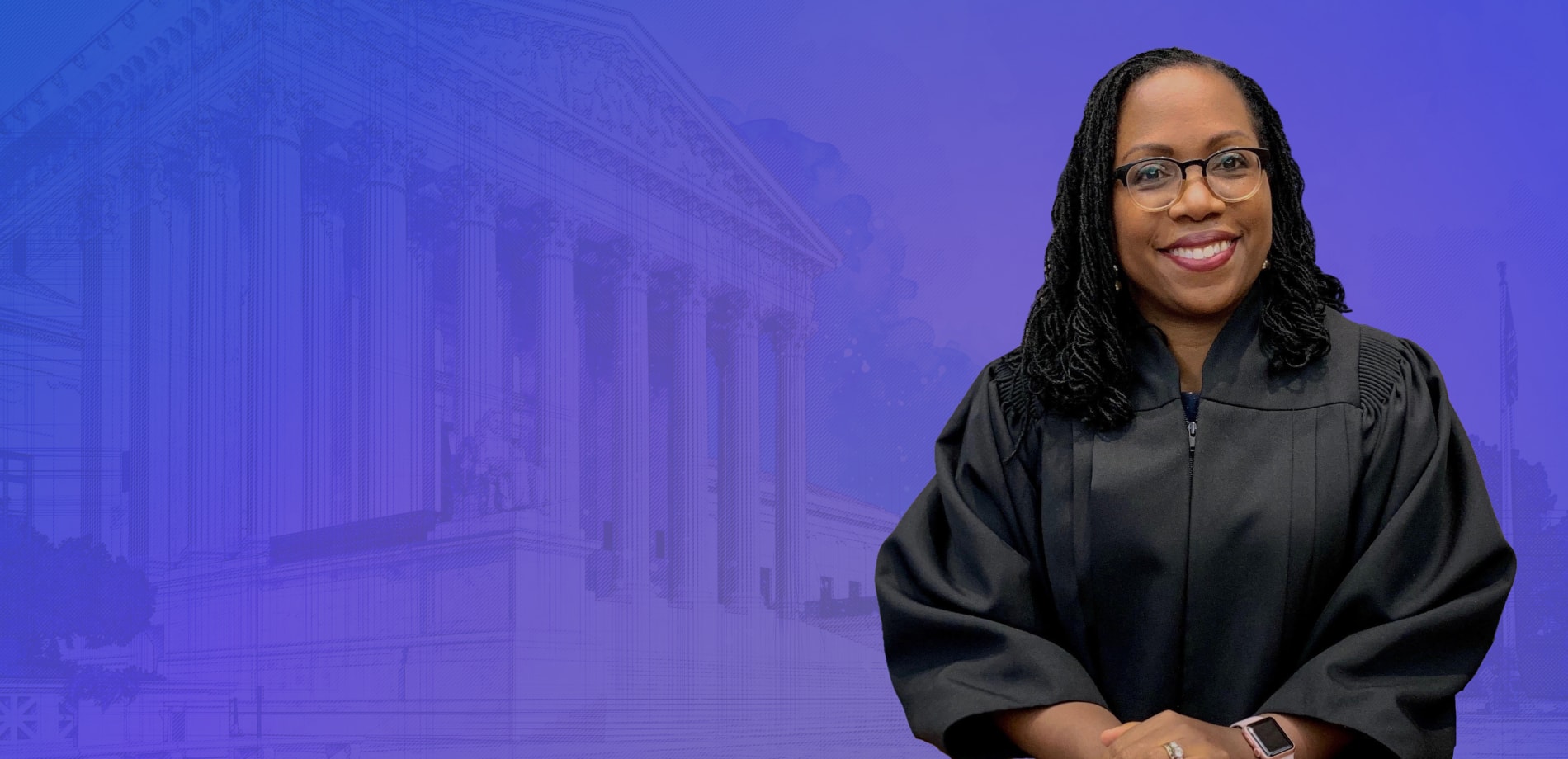
The Senate Confirms Ketanji Brown Jackson to serve on the U.S. Supreme Court
On February 25, 2022, President Joe Biden nominated Judge Ketanji Brown Jackson to become the 116th Associate Justice of the United States Supreme Court.
On April 7, 2022, a bipartisan group of Senators confirmed Judge Jackson's nomination.
Since Justice Stephen Breyer announced his retirement, President Biden has conducted a rigorous process to identify his replacement. President Biden sought a candidate with exceptional credentials, unimpeachable character, and unwavering dedication to the rule of law. And the President sought an individual who is committed to equal justice under the law and who understands the profound impact that the Supreme Court’s decisions have on the lives of the American people.
That is why the President nominated Judge Ketanji Brown Jackson to serve as the next Justice on the Supreme Court. Judge Jackson is one of our nation’s brightest legal minds and has an unusual breadth of experience in our legal system, giving her the perspective to be an exceptional Justice.
About Judge Ketanji Brown Jackson
Judge Jackson was born in Washington, DC and grew up in Miami, Florida. Her parents attended segregated primary schools, then attended historically black colleges and universities. Both started their careers as public school teachers and became leaders and administrators in the Miami-Dade Public School System. When Judge Jackson was in preschool, her father attended law school. In a 2017 lecture, Judge Jackson traced her love of the law back to sitting next to her father in their apartment as he tackled his law school homework—reading cases and preparing for Socratic questioning—while she undertook her preschool homework—coloring books.
Judge Jackson stood out as a high achiever throughout her childhood. She was a speech and debate star who was elected “mayor” of Palmetto Junior High and student body president of Miami Palmetto Senior High School. But like many Black women, Judge Jackson still faced naysayers. When Judge Jackson told her high school guidance counselor she wanted to attend Harvard, the guidance counselor warned that Judge Jackson should not set her “sights so high.”
That did not stop Judge Jackson. She graduated magna cum laude from Harvard University, then attended Harvard Law School, where she graduated cum laude and was an editor of the Harvard Law Review.
Judge Jackson lives with her husband, Patrick, and their two daughters, in Washington, DC.
Experience
Judge on the U.S. Court of Appeals for the D.C. Circuit
Judge Jackson was one of President Biden’s first judicial nominees. She was confirmed with bipartisan support to the U.S. Court of Appeals for the D.C. Circuit in 2021.
Judge on the U.S. District Court for the District of Columbia
President Obama nominated Judge Jackson to be a district court judge for the U.S. District Court for the District of Columbia in 2012. She was confirmed with bipartisan support in 2013.
Vice Chair of the U.S. Sentencing Commission
President Obama nominated Judge Jackson to serve as the Vice Chair of the U.S. Sentencing Commission in 2009, and she was confirmed with bipartisan support in 2010. Prior to serving as a judge, Judge Jackson followed in the footsteps of her mentor Justice Breyer by working on the U.S. Sentencing Commission. The Commission, which President Biden fought to create as a member of the U.S. Senate, is bipartisan by design. Her work there focused on reducing unwarranted sentencing disparities and ensuring that federal sentences were just and proportionate.
Public defender
Judge Jackson represented defendants who did not have the means to pay for a lawyer. She would be the first former federal public defender to serve on the Supreme Court.
Supreme Court Clerk
Judge Jackson served as Justice Breyer’s law clerk, and learned up close how important it is for a Supreme Court Justice to build consensus and speak to a mainstream understanding of the Constitution.
Perspective on the Legal System
Because of her diverse and broad public service, Judge Jackson has a unique appreciation of how critical it is for the justice system to be fair and impartial. With multiple law enforcement officials in her family, she also has a personal understanding of the stakes of the legal system. After serving in the U.S. Army and being deployed to Iraq and Egypt, Jackson’s brother served as a police officer in Baltimore and two of her uncles were police officers in Miami.
IN THEIR OWN WORDS
About the Nomination Process
What criteria did President Biden use to pick his nominee?
President Biden conducted a rigorous process to identify Justice Breyer’s replacement. As the longtime Chairman of the Senate Judiciary Committee, the President took seriously the Constitution’s requirement that he make this appointment “by and with the Advice and Consent of the Senate,” seeking the advice of Senators in both parties. He studied the histories and case records of candidates and consulted legal experts. Confirming exceptionally qualified judicial nominees with varying backgrounds and experiences has been a key priority for the President since he took office.
President Biden sought a candidate with exceptional credentials, unimpeachable character, and unwavering dedication to the rule of law. He also sought a nominee—much like Justice Stephen Breyer—who is wise, pragmatic, and has a deep understanding of the Constitution as an enduring charter of liberty. And finally, the President sought an individual who is committed to equal justice under the law who understands the profound impact that the Supreme Court’s decisions can have on the lives of the American people.
On February 25, 2022, President Joe Biden nominated Judge Ketanji Brown Jackson to become the 116th Associate Justice of the United States Supreme Court.
On April 7, 2022, a bipartisan group of Senators confirmed Judge Jackson's nomination.







